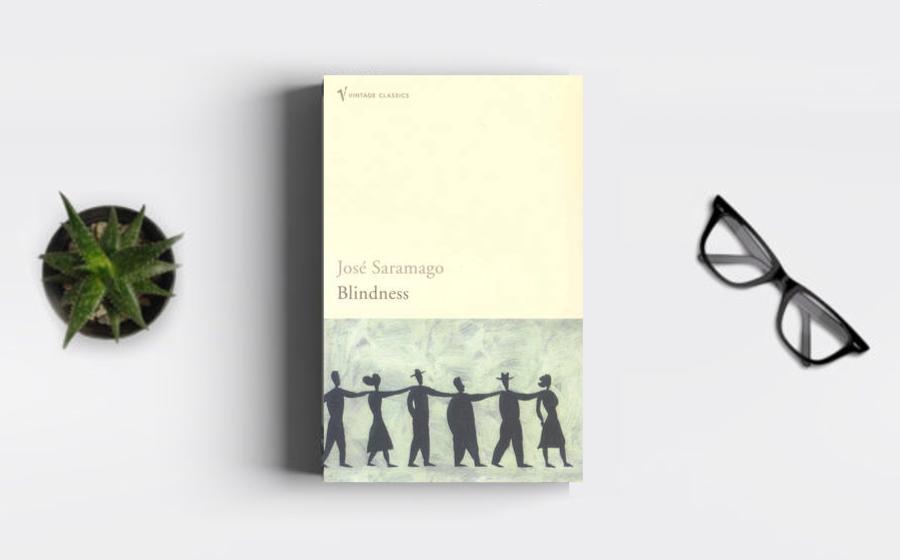"Blindness," published in 1995, is a haunting and
allegorical narrative that plunges readers into a world
of sudden and unexplained blindness. As society crumbles
under the weight of an epidemic, Saramago's novel
becomes a profound exploration of the human condition,
morality, and the resilience of the human spirit in the
face of existential crisis. Through the lens of a
dystopian world in which the loss of sight becomes a
metaphor for societal breakdown, "Blindness" offers
poignant reflections on life, humanity, and the
precarious nature of civilization.
The novel
unfolds with an inexplicable epidemic of sudden
blindness that spreads rapidly through an unnamed city.
As individuals are struck by "white blindness," losing
their ability to see, the social fabric begins to
unravel. The government's response is to quarantine the
afflicted in an abandoned mental hospital, leading to
the isolation of the blind from the rest of society.
This descent into chaos serves as the backdrop for
Saramago's profound reflections on life.
The loss
of sight becomes a central metaphor that permeates every
aspect of the narrative. Saramago uses blindness not
only as a physical condition but as a symbolic
representation of moral blindness, the inability to see
and understand one another on a deeper level. Through
the characters' struggle to adapt to their new reality,
readers are prompted to reflect on the fragility of the
human experience and the tenuous nature of the societal
structures that shape our lives.
One of the
novel's key themes is the exploration of the thin veneer
of civilization and how quickly it disintegrates in the
face of crisis. As the blind are abandoned to fend for
themselves in the quarantine, social norms break down,
and the basest instincts of survival take over.
Saramago's portrayal of this descent into anarchy
becomes a reflection on the fragility of the social
contract and the ease with which humanity can revert to
primal behaviors when confronted with adversity.
The protagonist, an ophthalmologist's wife, becomes a
central figure in the narrative as one of the few
characters who remains sighted. Her decision to pretend
to be blind to stay with her husband in the quarantine
exposes the lengths individuals will go to preserve
connections in a world unraveling at the seams. This act
becomes a poignant reflection on the power of human
relationships and the sacrifices individuals make to
maintain their humanity in the darkest of times.
Saramago's writing style, characterized by long, flowing
sentences and minimal punctuation, contributes to the
immersive and disorienting experience of the novel. The
lack of traditional dialogue markers and quotation marks
blurs the boundaries between characters, making the
narrative feel like a collective consciousness. This
stylistic choice becomes a vehicle for Saramago to
explore the interconnectedness of humanity, prompting
readers to reflect on the ways in which our lives are
intricately woven together.
The novel also delves
into the theme of resilience and the indomitable human
spirit. Despite the dire circumstances and the loss of
civilization, the characters in "Blindness" demonstrate
remarkable adaptability and an innate will to survive.
Saramago's portrayal of their struggle becomes a
testament to the human capacity for resilience and the
determination to find meaning even in the bleakest of
situations. The novel prompts readers to reflect on the
strength of the human spirit and the potential for
endurance in the face of overwhelming challenges.
In the absence of societal norms and structures, the
characters in the quarantine must grapple with questions
of morality and ethics. As resources become scarce, the
blind community faces moral dilemmas that force them to
confront the darker aspects of human nature. Saramago's
exploration of these ethical quandaries becomes a
profound reflection on the nature of morality itself
- a
construct that, when stripped of societal frameworks, is
revealed as a deeply subjective and fragile concept.
The novel's narrative arc, from the initial onset of
blindness to the slow recovery of sight, becomes a
metaphorical journey of enlightenment. As characters
regain their vision, the world that was once taken for
granted becomes a source of awe and wonder. This
metaphorical journey prompts readers to contemplate the
value of perspective and the transformative power of
seeing the world through new eyes. Saramago invites us
to reflect on the significance of perception in shaping
our understanding of life and the potential for renewal
even in the face of profound darkness.
The
allegorical nature of "Blindness" allows for multiple
interpretations, and Saramago refrains from offering
easy answers. The ambiguous ending, in which the
characters emerge from their ordeal changed but
uncertain of the future, becomes a powerful reflection
on the complexity of the human experience. Saramago's
refusal to provide a neatly packaged resolution
encourages readers to grapple with the uncertainties of
life, the ambiguous nature of truth, and the inherent
unpredictability of the human journey.
"Blindness" by Jose Saramago is a visionary and contemplative novel that offers profound reflections on life, society, and the indomitable nature of the human spirit. Through the lens of a world plunged into darkness, Saramago prompts readers to reflect on the fragility of civilization, the interconnectedness of humanity, and the transformative power of resilience.






